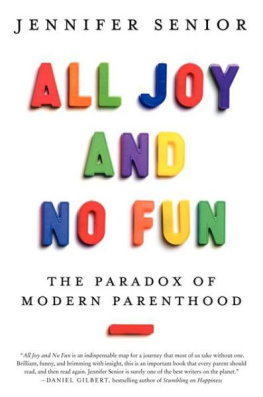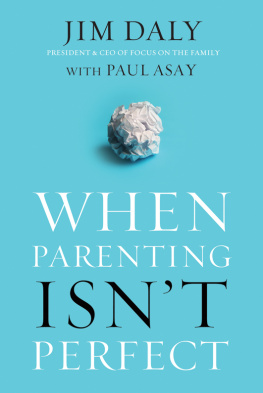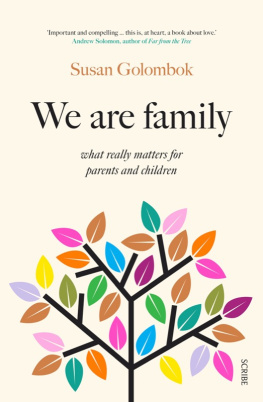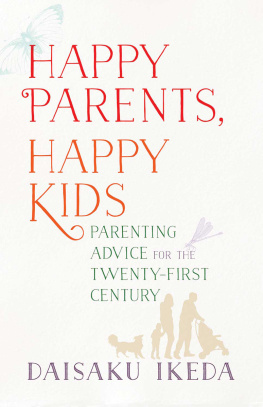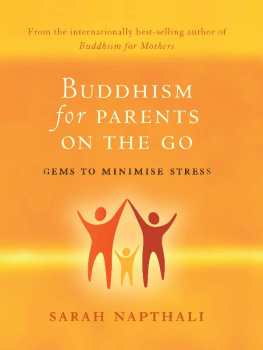To Rusty
contents
THERES THE PARENTING LIFE of our fantasies, and theres the parenting life of our banal, on-the-ground realities. Right now, theres little question which one Angelina Holder is living. Eli, her three-year-old son, has just announced hes wet his shorts.
Okay, says Angie, barely looking up. Shes on a schedule, making Shake n Bake chicken parmesan for lunch. Her evening shift at the hospital starts at 3:00 P.M . Go upstairs and change.
Eli is standing on a chair in the kitchen, picking at blackberries. I cant.
Why not?
I cant.
I think you can. Youre a big boy.
I cant.
Angie unpeels the oven mitt from her hand. What is Mommy doing?
Changing me.
No, Im cooking. So were in a pickle.
Eli starts to whimper. Angie stops what shes doing. She looks annoyed, amused, and above all, baffled. There must be protocols for how to handle this kind of farcical exchange in parenting books, but she doesnt have time for books right now. Shes got lunch to make, dishes to wash, and nursing scrubs to change into.
Why cant you change yourself? she asks. I want to hear this reasoning of yours.
I cant.
Angie stares at her son. I can see her making the rapid calculation all parents make at this point in a cage match with a child, trying to determine whether it pays to relent. Eli is indeed capable of changing his own clothes, and unlike most three-year-olds, he usually succeeds on his first try, with his shirt facing forward and one limb in each pant leg. She could, in theory, hold her ground.
Maybe you can go upstairs and get me new clothes for you to change into, she says, after mulling it over. Maybe you can find me some green underwear. In your underwear bin?
From an adults perspective, this deal has all the face-saving elements of a good compromise. Its win-win. But Eli, being three, is not taking yes for an answer. Stalling, he wanders over to Angies knapsack. I think Zay wants this, he says, fishing out a granola bar. Zay, short for Xavier, is his younger brother.
No, he doesnt. Angie is calm, but firm. Shes picked a lane, and shes staying in it. I need you to do what I ask you to. Youre not listening right now.
Eli keeps sifting through the bag. Angie walks over and points him toward the stairs.
I need help! protests Eli.
No, you dont, she answers. I put all your clothes where theyre supposed to be. Go upstairs and get them. A suspenseful couple of seconds tick by. Brinksmanship with a three-year-old . She looks conspiratorially at Zay. Your brothers being silly, isnt he? What are we going to do with him?
Eli huffs but capitulates, slowly making the climb to his room. A minute or so later, he appears at the top of the staircase, naked as a cupid, and tosses down a pair of clean green underwear.
You did find your green underwear, Angie exclaims. Good job!
She beams and pounces on it, as if it were a bridal bouquet.
BEFORE BECOMING A PARENT, Angie, it seems safe to say, would never have imagined that shed be delighted to witness a preschooler throwing underwear down the stairs. She probably wouldnt have imagined the elaborate negotiation that preceded this gesture either, or that this kind of negotiationat once ridiculous and agitatingwould become a regular part of her mornings and afternoons. Before this, Angie worked as a psychiatric nurse in the evenings and biked and painted in her off-hours; on weekends, she went hiking with her husband at Minnehaha Falls. Her life was just her life.
But the truth is, theres little even the most organized people can do to prepare themselves for having children. They can buy all the books, observe friends and relations, review their own memories of childhood. But the distance between those proxy experiences and the real thing, ultimately, can be measured in light-years. Prospective parents have no clue what their children will be like; no clue what it will mean to have their hearts permanently annexed; no clue what it will feel like to second-guess so many seemingly simple decisions, or to be multitasking even while theyre brushing their teeth, or to have a ticker tape of concerns forever whipping through their heads. Becoming a parent is one of the most sudden and dramatic changes in adult life.
In 1968, a sociologist named Alice Rossi published a paper that explored the abruptness of this transformation at great length. She called it, simply, Transition to Parenthood. She noted that when it comes to having a child, there is no equivalent of courtship, which one does before marriage, or job training, which one does before, say, becoming a nurse. The baby simply appears, fragile and mysterious and totally dependent.
At the time, it was a radical observation. In Rossis day, scholars were mainly concerned with the effect of parents on their children. What Rossi thought to do was swing the telescope around and ask this question from the reverse perspective: What was the effect of parenthood on adults ? How did having children affect their mothers and fathers lives? Forty-five years later, its a question were still trying to answer.
I FIRST STARTED THINKING about this question on the evening of January 3, 2008, when my son was born. But I didnt really explore it until more than two years later, when I wrote a story for New York magazine that examined one of the more peculiar findings in the social sciences: that parents are no happier than nonparents, and in certain cases are considerably less happy.
This conclusion violates some of our deepest intuitions, but it stretches back nearly sixty years, even predating Rossis research. The first report came in 1957, a peak time for the veneration of the nuclear family. The paper was called Parenthood as Crisis, and in just four pages the author managed to destroy the prevailing orthodoxy, declaring that babies weaken marriages rather than save them. He quoted a representative mother: We knew where babies came from, but we didnt know what they were like [emphasis his]. He then listed the complaints of the mothers he surveyed:
Loss of sleep (especially during the early months); chronic tiredness or exhaustion; extensive confinement to the home and the resulting curtailment of their social contacts; giving up the satisfactions and the income of outside employment; additional washing and ironing; guilt at not being a better mother; the long hours and seven day (and night) week necessary in caring for an infant; decline in their housekeeping standards; worry over their appearance (increased weight after pregnancy, et cetera).
Fathers added more economic pressure, less sex, and general disenchantment with the parental role to the brew.
In 1975, another landmark paper showed that mothers presiding over an empty nest were not despairing, as conventional wisdom had always assumed, but happier than mothers who still had children at home; during the eighties, as women began their great rush into the workforce, sociologists generally concluded that while work was good for womens well-being, children tended to negate its positive effects. Throughout the next two decades, a more detailed picture emerged, with studies showing that children tended to compromise the psychological health of mothers more than fathers, and of single parents more than married parents.
Meanwhile, psychologists and economists started to stumble across similar results, often when they werent looking for them. In 2004, five researchers, including the Nobel Prizewinning behavioral economist Daniel Kahneman, did a study showing which activities gave 909 working women in Texas the most pleasure. Child care ranked sixteenth out of nineteenbehind preparing food, behind watching TV, behind napping, behind shopping, behind housework. In an ongoing study, Matthew Killingsworth, a researcher at UC Berkeley and UC San Francisco, has found that children also rank low on the list of people whose company their parents enjoy. As he explained it to me in a phone conversation: Interacting with your friends is better than interacting with your spouse, which is better than interacting with other relatives, which is better than interacting with acquaintances, which is better than interacting with parents, which is better than interacting with children. Who are on par with strangers.
Next page
